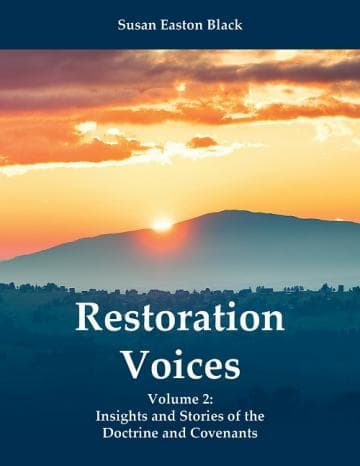Book
140 Chapters

The history of D&C 113 is linked to the arrival of Joseph Smith’s brother Samuel Smith in Far West, Missouri. As Joseph was walking with Samuel in March 1838, Elias Higbee and other brethren approached them. These brethren had questions about the interpretation of verses in chapter 52 of the Book of Isaiah and looked to Joseph for answers. It is not known which of the brethren asked about the first Isaiah passages interpreted in section 113, but it is known that Elias Higbee asked the last.
Why did these brethren have questions about the writings of Isaiah? The answer is simple—most of us find the writings of Isaiah hard to understand. Yet Elder Bruce R. McConkie said, “It just may be that my salvation (and yours also!) does in fact depend upon our ability to understand the writings of Isaiah as fully and truly as Nephi understood them.”[1]
Isaiah points his readers to Jesus Christ, covenants, and the temple. His is a warning voice yet a voice of promise as he tells of the restoration of lost truths, promised lands, and of Israel’s rightful king.
What is impressive about the writings of Isaiah is how often they are quoted by other prophets. There are 66 chapters in the book of Isaiah and 1,292 verses. There are 433 verses of Isaiah in the Book of Mormon. The Nephite prophets etched approximately 35 percent of the book of Isaiah on the gold plates. In every instance, when the charge was given to “search,” “liken,” “understand,” “read,” or “remember” Isaiah’s words, a significant covenant-renewing experience had just happened or was in process.
In the Doctrine and Covenants there are over 70 quotations or paraphrases of Isaiah. Isaiah’s prophesies are quoted more often in the New Testament than the words of any other prophet. Bottom line—the Lord told the Nephites that “great are the words of Isaiah,” and that all things Isaiah spoke of the house of Israel and of the Gentiles would be fulfilled” (3 Nephi 23:1–2).
To help gain the proper understanding of Isaiah, knowledge of spiritual, cultural, and geographic barriers in his day is helpful. In that era all nations believed in deities. For example, the Philistines worshiped the god Dagon, and the Canaanites, the god Baal. Isaiah preached that Jehovah was the God over Judah and all nations. Isaiah wrote about what pleased and displeased Jehovah. In his writings he denounced the worst vices, indolence, and abominations. In so doing he explained that Jehovah is the Lord of Judgment and that reward and punishment rests with him. This doctrine he clothed in symbolism and prophetic foresight. Scholar Hugh W. Nibley wrote, “Isaiah promises the greatest blessings and glory to the lowly, the poor, the oppressed, the afflicted, and the needy. What! Is being poor and oppressed an achievement?”[2] To Isaiah, humility and obedience to God are supreme. His message is hope for the repentant and destruction for the willful.
Book
140 Chapters
Items in the BMC Archive are made publicly available for non-commercial, private use. Inclusion within the BMC Archive does not imply endorsement. Items do not represent the official views of The Church of Jesus Christ of Latter-day Saints or of Book of Mormon Central.